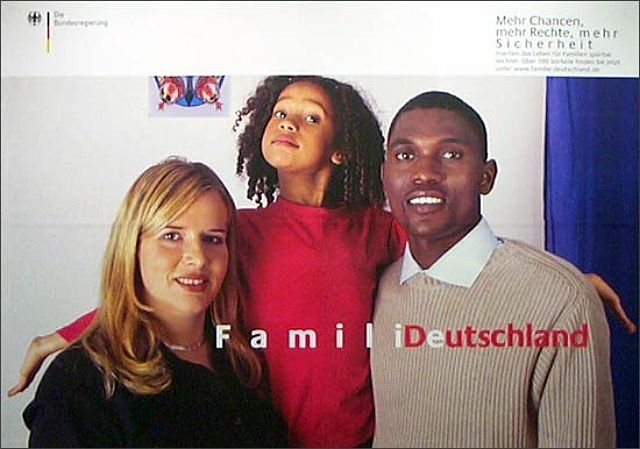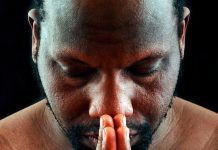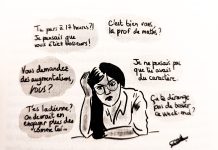The Afro-German project of Asoka Esuruoso and Philipp Khabo Köpsell
Arriving in the future, Stories of Home and Exile will be an interdisciplinary approach to positioning. As a collection of poetry, short stories and academic essays on identity written by Black Writers who regard Germany as their home, and those who regard it as permanent or temporary exile, it will attempt to add a new layer to the debate and construction of Black Identity within the German context.
“There is an oversimplification of the Negro. He is either pictured by conservatives as happy, picking his banjo, or by the so-called liberals as low, miserable, and crying. The Negro’s life is neither of these. Rather, it is in-between and above and below these pictures.”
– Zora Neale Hurston 1944
What she speaks of is identity in its flattest form. The identity that people once saw when they looked at a black face, flat, blank, static, like a snap shot frozen in time. There was no breath behind the lips, no thoughts behind the mind. We were caricatures of ourselves, like a child’s drawing. It is a false image. Diversity and texture have been and continue to be at the core of Black identity. To be human is by definition to be complex. Yet the Oversimplified image persists, like a ghost that you just can’t shake, or a photo you can’t wipe free.
To escape simplification, new layers needed to be applied. From the African American Slave narratives quest for human dignity, to Du Bois’ The Souls of Black Folk, Zora Neale Hurston’s Their Eye’s Were Watching God, Franz Fanon’s Black Skin White Masks, Achebe’s Things Fall Apart, May Ayim’s Showing Our Colors and Blues in Black and White, and countless, countless more every literary generation has added a new layer to the image of Black identity and experience.
Writing, through their fingers, became a way to reclaim existence and define selfhood. Writing was much more than expression, more than the spiritual liberation of the burden of knowing. It was the creation of new realities and new unlimited spaces. It was the breaking of old frames to give space for a bigger picture. The existence of a thought became a fact in black and white. It became a solid foundation for new perspectives.
However while anthologies of African American literature have been published since 1845, and African writers such as Chinua Achebe, Ben Okri, Ama Ata Aidoo and Chimamanda Ngozi Adichie (among others) have gained acclaim on the world stage, the writing and experiences of Black individuals within Germany has, even to this day, been largely ignored. Literary studies on Black Identity within the German context are still very few and far between, and the layers this Black German identity have added to the image of broader Black identity has often been overlooked.
“…und wenn Du dazu noch schwarz bist” (Edition Con) and “Showing Our Colors: Afro-German Women Speak Out” (Orlanda) in 1984 and 1986 were really the first testimonies on the lives of the African Diaspora in Germany to gain notice within mainstream German society. For Black individuals living in Germany – for those living in isolation – these publications became undeniable proof of the validity of their personal experiences. These texts offered a foundation for numerous other publications and further literary expression. They gave a deeper background and a clearer focus that allowed further perspectives.
For Afro-German writers in the 1980s it was imperative to be regarded as part of German society, while for Black writers from other countries (either as travelers, immigrants, or refugees) the focus was on networking and contributing their own voices.
Yet in the early 1990’s the acceptance of Black individuals within German society suffered from a post-unification hang-over. It took a turn for worse with the firebombing of refugee homes, and the reoccurring presence of neo-fascist mobs. A sudden mainstream acceptance of exclusivist rhetoric and a new idea of the white German “self” vs. “the other” left undeniable traces across the German landscape and within the writing of Black authors.
“[E]s ist nicht wahr/ daß es nicht wahr ist/so war es/ erst zuerst dann wieder.” So reads the beginning of May Ayim’s poem Deutschland im Herbst, drawing disturbing parallels between the fascist Kristallnacht of November 9th 1938 and the murder of Angolan immigrant Amadeu Antonio Kiowa in 1990.
Parallel to the desire for societal acceptance a different question arose in the aftermath of this violence and rejection. Being a member of the African Diaspora, how does one definehome? For many people with African roots the concept of home and belonging can appear fragile. In the late 1990s, many Black authors negotiated this concept by depicting Africa as exile, utopia, or potentially a new/old place of belonging.
“I’m not at home/ still not at home/ not my country/ just my origin/ one of my origins” writes Olumide Popoola in her poem Nigeria – partly resigning, partly equivocating the concept of home.
Then in the late 1990’s TV celebrities like Arabella Kiesbauer, Mo Asumang and Mola Adebisi slowly made it possible for Black individuals to be regarded as part of German society by the white majority. Yet how fragile the concept of Black Germaness remains became obvious in the aftermath of the 9/11 attacks. The term Migrationshintergrund (migration background) gained new popularity and is still being used as footnote for the description of all Germans deviating from the 1930s image of the “Ideal German.”
Now the writing of the new millennium shows a new paradigm shift: The desire to be part of something much bigger. Black writers are again embracing the term “diaspora.” Accompanied by the academic discourse of Paul Gilroy’s Black Atlantic new alliances are being forged that stretch across the continents. Poetry is brimming over with Pan-African references from Ancient Egypt to the transatlantic slave trade all the way to 1960s Black power rhetoric.
“Dreihundert Jahre alte Seelen/ über den Ozean geweht”, writes Angela Alagiyawanna-Kadalie. While Chantal Sandjon lyrically dreams of “revolution in red black & green,” (the colors of Garvey’s Pan- African flag).
Like all those that have come before, this new shift will inevitably add its own layers, colors, and strokes to the ever-changing image of Black Identity. This process is unending, and yet is essential and just as important now as it has ever been.
“The problem of the 20th century is the problem of the color line…” So begins The Souls Of Black Folk Du Bois’ groundbreaking treatise on black psychology written over a century ago. Yet in this post 9/11 Globalize World fraught with economic, cultural, religious, and racial tensions his words ring just as true a hundred years later as they ever did. Du Bois was attempting to pull back a veil so that readers might gain a peak into the depths and meaning of the black soul, for he believed the health of any democratic nation is dependent upon the health of its minorities. They are like canaries in the coal mine of political freedom and equality.
Now through this collection of thoughts, stories, poems and essays by current Black writers in Germany Arriving in the future, Stories of Home and Exile will attempt once again to pull back a veil and give the world a another peak into the depth and meaning of Black German identity.





